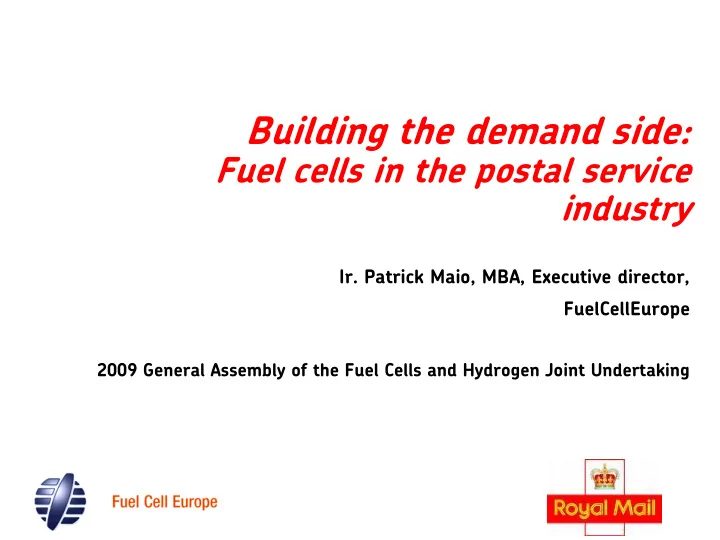

Building the demand side: Fuel cells in the postal service industry Ir. Patrick Maio, MBA, Executive director, FuelCellEurope 2009 General Assembly of the Fuel Cells and Hydrogen Joint Undertaking 1
Agenda • Fuel cells in postal services: Case studies • Royal Mail, PostEurope and FuelCellEurope initiative • Example of Royal Mail‟s Hydrogen Strategy: Context Targets and challenges • Conclusion: Opportunities for enhancing cooperation between the postal and the fuel cell industry 2
Fuel cells in the postal industry: Case studies • USPS • CHP plant delivered in USPS processing and distribution facility in Anchorage, Alaska • USPS operating Hydrogen3 min-vans since 2006 • USPS operating Chevrolet Equinox since 2008 • DHL Express ss Japan pan: Daimler F-Cell vehicle operated in very dense area of Tokyo with very frequent stops • FedEx x Canada ada ‟s facility located at the Toronto International Airport: Hydrogenics fuel cell powered forklift truck • Royal Mail initiated partnership involving CENEX, PostEurope and FuelCellEurope to develop a universal design specification for a HFC Car Derived Van 3
Royal Mail, PostEurop and FuelCellEurope initiative • March 2009: Royal Mail, PostEurop and FuelCellEurope joined forces: Working with CENEX for the development of a universal design specification for hydrogen fuel cell postal vans. To engage with OEMs to accelerate the development of hydrogen fuel cells postal van To accelerate a broader adoption by other postal operators • Summer 2009: FuelCellEurope establishes Customer Application Group Postal Services. Discussions with Poste Italiane, Deutshe Post, La Poste (FR) • 15 Sept. 2009 : Joint task force established to develop joint project on fuel cell delivery vehicles across Europe • 22 Oct. 2009: Project concept presented to other postal operators 4
Context - Royal Mail CO2 Scope 1 Business road Scope 1 Natural gas and oil 2% 18% Scope 2 Grid electricity 36% 2% Scope 3 Business air & rail 9% Scope 3 Personal travel (on business) 21% 12% Scope 3 Commuting to work 360,000 tonnes Scope 3 Business mail in CO2 from fleet privately owned vehicles 5
Context – Vehicle CO 2 50% 40% 30% 20% 10% 0% CDV - 14476 Small People - - 1319 SPV - 4610 MPV - 1315 LPV - 1422 Crew/Post - 3264 Small Rigid - 2269 Medium Rigid - 355 Tractor - 1316 Car - 3025 CO2 % Fleet % 6
Targets Carbon neutral London by 2012 Including 50% CO 2 Tailpipe Reduction Carbon neutral business wide by 2015 50% CO2 Reduction 7
What‟s Next - 2012 Target • Carbon Neutral – 50% of 2004/05 emissions • Target 2012 2015 • Vehicles 2,100 24,000 „as is‟ 413 2171 Low Co2 556 1107 Hybrid/CBG 229 12288 Electric 884 8669 8
h2 ? - Product Evaluation Develop Tender Technical Maturity Operational Fit Low volume, short term trial – Statistically Significant trials – Vendor to Manage With view to Contract Investigate Influence Paper Exercise Minimal trial Operational Acceptance Production Capacity 9
h2 ? - MAC Curve t CO2 £ / t CO2 Trailer Aero Kit 71 -111 † LGV Tractor Methane 898 £1 † LGV Rigid Methane 611 £3 † LGV 7.5t Methane 317 £18 LGV 7.5t Hybrid 404 £96 LGV 7.5t e 47 £221 CDV Methane 76 £274 CDV e 60 £280 LGV Rigid Hybrid 147 £327 Vehicle Technology MAC Curve - WTW CDV Hybrid - Full 11 £651 † Technology not yet in production £800 £750 £700 £650 Cost / t CO2 saved £600 £550 £500 £450 £400 £350 £300 £250 £200 £150 £100 £0 £50 -£50 -£100 200 400 600 800 1000 1200 1400 1600 1800 2000 2200 2400 2600 2800 WTW CO2 t 10 10
Challenges • Infrastructure • Reliability • Availability • Cost 11 11
Conclusion: Opportunities for enhancing cooperation between the postal and the fuel cell industry • Energy efficiency and carbon mitigation at core of the postal industry‟s future • Collective needs of the postal industry are huge in terms of delivering vehicles, material handling equipment and back-up power. • Most equipments and vehicle fleets operate in a finite environment requiring a lesser capital intensive hydrogen infrastructure to start. • Dr Martin Blake, the Royal Mail's Head of Sustainability stated “We clearly see hydrogen fuel cell technology as the future means of small and medium vehicle propulsion in the not too distant future, it is now just a question of seeing which one of the major motor manufacturers can bring such fuel cell commercial vehicles to market in large numbers and reasonable prices first”. • Major OEM and leading fuel cell players should engage in this kind of initiative: join forces together with us and make sure companies such as Royal Mail get the necessary level of support they deserve ! 12 12
Contacts • Tony Shaw, Head of vehicle procurement, Royal Mail Group: tony.z.shaw@royalmail.com • Patrick Maio, FuelCellEurope: p.maio@fuelcelleurope.org 13 13
Recommend
More recommend